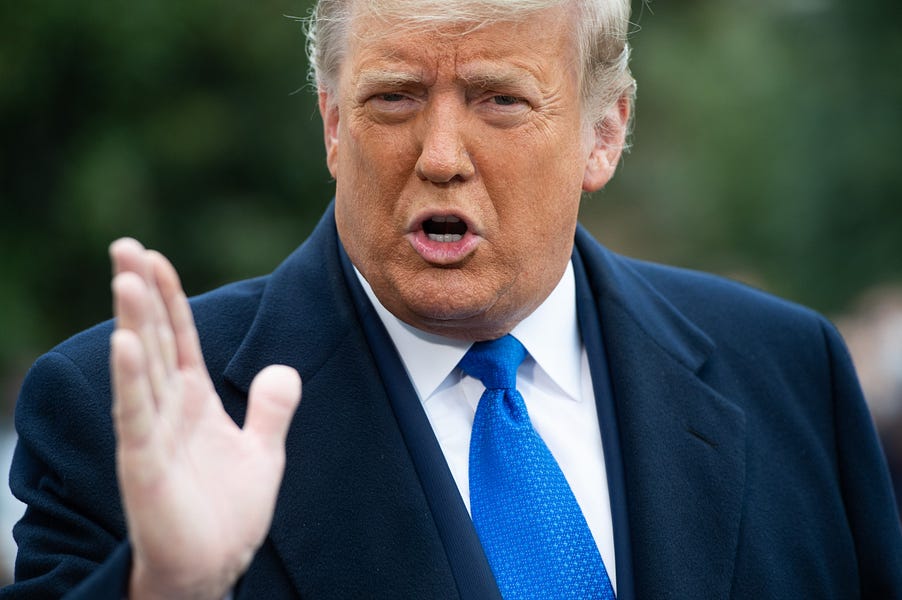In a January 30 statement, Donald Trump claimed that the recent bipartisan effort to amend the Electoral Count Act of 1887 is evidence that former Vice President Mike Pence had the power to overturn the results of the 2020 presidential election.
This is a false claim.
In Trump’s words: “If the Vice President (Mike Pence) had ‘absolutely no right’ to change the Presidential Election results in the Senate, despite fraud and many other irregularities, how come the Democrats and RINO Republicans, like Wacky Susan Collins, are desperately trying to pass legislation that will not allow the Vice President to change the results of the election? Actually, what they are saying, is that Mike Pence did have the right to change the outcome, and they now want to take that right away. Unfortunately, he didn’t exercise that power, he could have overturned the Election!”
First, some context on the Electoral Count Act of 1887, which we noted in a previous fact check details the process of counting electoral votes in Congress and does not grant the vice president the power to overturn the results of an election.
Rebecca Green, law professor and co-director of the election law program at William and Mary, noted at the time how exactly this process works:
The vice president presides over the joint session, which means he or she sits in the Speaker of the House’s chair and has the “power to preserve order.” (3 U.S.C. §§ 15, 16, 18). This power is not substantive: It is the standard obligation of a presiding officer in a chamber of Congress to preserve order and decorum among lawmakers and in the galleries (See Standing Rules of the Senate XIX.4, XIX.6, S. Doc. 113-18 (Jan. 24, 2013); Rules of the House of Representatives I.2, 116 Cong.). During the joint session, the vice president is required to open, in alphabetical order by state, “all the certificates and papers purporting to be certificates of the electoral votes.” (§15) After opening all such returns from a state, the vice president hands them to four “tellers” who read the results and record the votes.
We asked Green about it. Just as a matter of logic, she explained, the idea that the vice president would have the power to overturn the results of the election does not make sense. “The idea that a single individual could single-handedly cast aside millions and millions of voters ballots is just not how any logical reading of either the Constitution or the Electoral Count Act could be construed.”
The 12th Amendment, as we have noted previously, gives the vice president a “ministerial role,” as Green put it. The 12th Amendment states: “The President of the Senate shall, in the presence of the Senate and House of Representatives, open all the certificates and the votes shall then be counted.”
In an email to The Dispatch Fact Check, Michael Morely, professor of law at Florida State University College of Law, similarly noted that: “The Vice President doesn’t have authority to unilaterally determine the outcome of presidential elections, or decide whether to count or reject particular slates of electoral votes. Both the original language of Article II, as well as the 12th Amendment, provide that, after states’ certificates of electoral votes are sent to the Vice President (in his or her capacity as President of the Senate), the Vice President ‘shall, in the presence of the Senate and House of Representatives, open all the certificates and the votes shall then be counted … ’”
Furthermore, on January 6, 2021, Pence himself issued a statement saying: “I do not believe that the Founders of our country intended to invest the Vice President with unilateral authority to decide which electoral votes should be counted during the Joint Session of Congress, and no Vice President in American history has ever asserted such authority.”







Please note that we at The Dispatch hold ourselves, our work, and our commenters to a higher standard than other places on the internet. We welcome comments that foster genuine debate or discussion—including comments critical of us or our work—but responses that include ad hominem attacks on fellow Dispatch members or are intended to stoke fear and anger may be moderated.
You are currently using a limited time guest pass and do not have access to commenting. Consider subscribing to join the conversation.
With your membership, you only have the ability to comment on The Morning Dispatch articles. Consider upgrading to join the conversation everywhere.